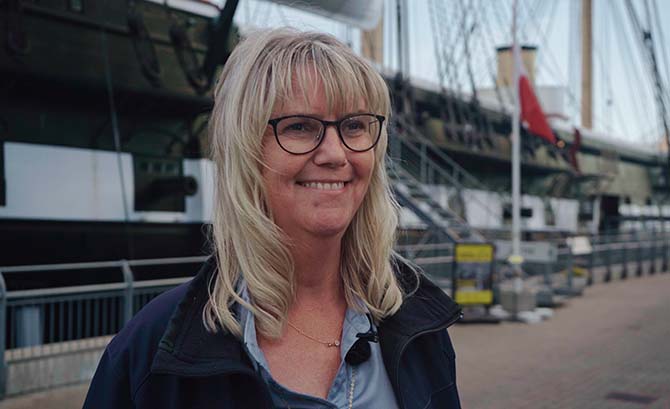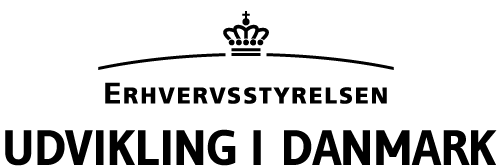NB. Udbyderen af servicen sætter cookies på din computer, når du afspiller eller deler videoen. Læs mere om cookies.
Recent years have not been easy for the tourism industry. COVID-19 kept the foreign tourists from coming. When the pandemic was over after several shutdowns, the tourists came back with new habits, needs, and desires. And right now, many tourist attractions face a difficult and unpredictable situation caused by the current inflation and energy crisis.
At one of Djursland’s major tourist attractions, the frigate Jylland in Ebeltoft, a daily battle is fought to win back the tourists. And with an increased focus on digitisation, the 162-year-old warship has – in a period of commotion with war and inflation – restored a faith in the future.
Karin Buhl Slæggerup, CEO at the frigate Jylland:
“2021 was a tough year with two shutdowns, but the first half of 2022 has been very positive, and we are quietly regaining the number of visitors. We have an ambitious goal of reaching 100,000 visitors by 2025, which we choose to believe in, even though increases in prices on energy and convenience goods make the situation unpredictable. We notice that many Danes have turned down their activity and that we can end up in a situation that requires for us to reconsider our budget.”
During all the turbulence, the frigate CEO is happy that a long-term focus was put on digitisation a while ago. The website has been updated, there is much greater focus on online marketing, an online booking system has been added, the bookkeeping has been moved to the “cloud”, and a new checkout system has provided invaluable knowledge about the customers.
The frigate CEO explains:
“Digitalisation has come gradually over the past three years, and we have raised our level of digitisation significantly, without it being terribly difficult or very expensive. If done with consideration, digitisation can actually be done cheaply.”
Along the way, Karin Buhl Slæggerup has strengthened her own digital understanding in the EU project Digital Ledelseskultur, run by UCL with several partners. The frigate CEO, together with several other East Jutland tourist attractions, participated in a ten-month competence course in 2021.
FACTS About the frigate Jylland
- Launched in 1860 as a warship with 44 cannons, a steam engine, and a crew of 437 sailors.
- Took part in the Battle of Helgoland in 1864 and has sailed as a royal ship and on voyages to exotic islands.
- In 1908, the frigate was taken out of service and was then, among other things, a telegraph ship and camp school ship.
- A restoration was started in 1989, and since 1994, the frigate has been a museum ship in Ebeltoft.
- Is today the world's longest preserved wooden warship.
1,200 have participated in competence development
In total, 122 employees from 79 companies in the tourism industry have gained strengthened digital competences in Digital Ledelseskultur. The vast majority have been managers, and this is the right approach, project manager Alice Bank Danielsen from Danish Coastal and Nature Tourism says. She has completed courses for 60 employees from 36 companies:
“If you want to change something, you have to start by improving the digital understanding in the management team.”
The tourism courses are just one corner of the EU project, which is divided into a nation-wide effort and a special effort on Zealand. A total of 660 micro-enterprises and SMEs have participated in the project, and 1,200 managers and employees have completed a competence course with workshops, networking and 1:1 sparring. The feedback has been positive: 44 per cent of the companies experience a strengthened customer relationship, and 62 per cent have gained access to new markets.
And the tourism courses in Digital Ledelseskultur have met a great need in the industry, project manager Alice Bank Danielsen explains:
“The tourism industry demands knowledge and competences because it can be difficult to see the possibilities and find the right solutions. In general, the degree of digitisation is lower in the tourism industry than in other industries. There are many seasonal workers and a wide spread of digital competences, and therefore changes must be implemented gradually.”
On the frigate Jylland, Captain Karin Buhl Slæggerup has set the course for more digitisation –at a pace so that the organisation can keep up. The digital tools are now in place, she says:
"With the new checkout system, we can now follow the customers’ purchases, and we know much more about them, and which products sell.”

CEO Karin Buhl Slæggerup is at the forefront of digitising the tourist attraction the frigate Jylland. Photo: Rostra Kommunikation
FACTS About Digital Ledelseskultur
Digital Ledelseskultur is a competence development programme which aims to strengthen the digital competences of managers and key employees in 420 Danish SMEs, so that they can ensure the company’s long-term survival strategy. The project has carried out a nation-wide effort and a special effort on Zealand.
The two efforts are co-financed by the EU’s Social Fund with DKK 20.3 million in the nation-wide effort and DKK 17.4 million in the effort on Zealand. Digital Ledelseskultur started in May 2018 and ends in November 2022.
The operator is UCL University College in partnership with University College North Jutland (UCN), Food & Bio Cluster, Danish Coastal and Nature Tourism and Roskilde Business School.
Read more about the nation-wide effort (in Danish)
Read more about the effort on Zealand (in Danish)
FACTS About the EU’s Social Fund
From 2014-2020, the EU’s Social Fund, Regional Development Fund and Danish partners invested DKK 1 billion each year in activities to create growth and employment throughout the country.
The Social Fund programme for 2014-2020 targeted entrepreneurship, education, and social inclusion to create more new businesses and a more skilled workforce. These are essential prerequisites for increased productivity, competitiveness, and growth.
Therefore, the EU’s Social Fund co-financed projects, which should:
- Increase entrepreneurial activity and ensure growth-oriented competence development in small and medium-sized companies
- Promote social inclusion – via specially designed youth education, integration courses into the labour market and social economic businesses
- Strengthen vocational and higher education

